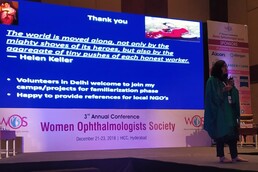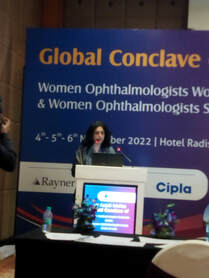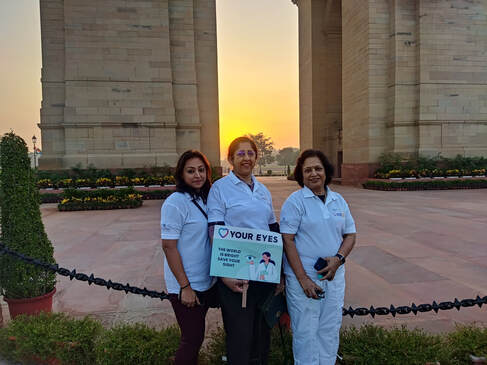|
10/12/2023 0 Comments World sight day 2023 -here's wishing great sight and wonderful insight to all our patients and colleagues !
0 Comments
Frequently washing the inside of the eye by splashing water in it is not a good idea. Tap water may be unclean. Even RO water (purified) is not recommended as it does not have the same composition physiologically as tears, nor the same PH. Tears are made just for the purpose of keeping the eyes moist and do their job well. Only if you have dry eyes (your doctor will diagnose this for you), you may need supplementation of your natural tears. For this there are quality controlled pharmacological lubricant eye drops.
Rubbing your eyes for any reason (itching, discomfort, in order to see better) is not recommended at all. You may feel a sense of satisfaction, but you are actually harming your eye. By rubbing your eye, you can accidentally graze the surface of your cornea, specially if there is a small foreign body in your eye. Rubbing the eyes can induce inflammation and congestion. Frequent rubbing is also a strong contributor to a disease called Keratoconus where the cornea becomes thin and bulges. What you can do instead when you feel like rubbing your eyes, is to put preservative free lubricating drops (available over the counter) for soothing the eye till you get further treatment from a doctor. You can also hold ice in a cloth for a few seconds over your closed lids for relief from itching (holding it for too long can cause pain). Call now 2/6/2022 3 Comments Dry EyesThis topic is very exhaustive, but here are some practical tips on dryness of eyes and its prevention.
The medical definition of dry eye underlines that it involves a complex interplay of factors. In simplified terms it is caused by several factors that lead to an imbalance in the tear film. This imbalance leads to discomfort. The tear film is unstable and is more particulate than smooth, there can be inflammation of the surface and the nerve endings also play a contributory role. Broadly speaking there are two categories – one in which the tears evaporate faster due to an alteration in the oily layer covering the tear film and the other where the aqueous or watery component of the tear film is reduced in amount. This distinction is made by your doctor and they will prescribe the treatment accordingly. What you can do at your own level to reduce the incidence of dry eye. Environment: A dry or polluted environment can cause dryness due to increased evaporation or irritation of the ocular surface. Be mindful of the cleanliness of the workplace surroundings. Make sure the AC filters are cleaned regularly and ensure any carpeted area is regularly vacuumed. You can modify air purity by using ground- based air purifiers or even desk purifiers or simple charcoal bags that absorb toxins. Certain plants like ferns and snake plant keep the air around them oxygen rich. Moisture can be increased by keeping bowls of water or using humidifiers. Avoid sitting in the line of the direct air stream and keep the AC fan on a low to moderate speed for gentle circulation. Self: While working on the computer, wear anti - glare glasses and keep the centre of the screen 6-8 inches below eye level so that the gaze is lowered and the lids half covered. This decreases evaporation. Take frequent breaks from gazing at the screen. Use preservative free lubricating eye drops frequently to keep the eyes moist. Help from ophthalmologists If the above symptoms persist, do show your ophthalmologist. They will treat you either for evaporative dry eye (which may involve a range of therapies from simple heat and massage applications on the lids, to machine assisted meibomian secretion expression and pulsed light) or for deficiency of tears and accompanying factors. The lubricating drops commonly used by the specialists fall into several categories and are normally preservative free, so safe to use over long periods. You may also need certain drops to stimulate tear production or mild steroids to reduce inflammation. Oral vitamins can help reduce dryness and sometimes oral antibiotics may be required for lid related pathologies. The doctor may also temporarily plug the tear outlet orifices (a painless procedure) to conserve whatever little tears are produced. Though dry eyes have become very common due to environmental pollution and increased screen usage, good remedies are available to improve the condition and the patient’s comfort. |
Dr. Anjali MehtaI am the founder eye-surgeon and consultant at Vasundhara Eye Centre Archives |




 RSS Feed
RSS Feed